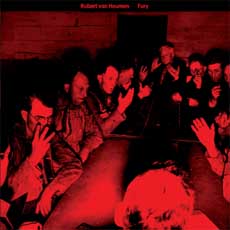
fury
Robert van Heumen
cs111
Fury is about
the primitive in man. The hidden part of us that we try very hard to suppress
or control, that boils within us and breaks through the surface only under
extreme circumstances. In the current state of the world, our minds are
constantly overloaded with information, all the time trying to deal with
others around us and our relationships with these people. We try to communicate
with them, to convey our inner world, but we fail to really make contact.
Frustration and anger can surface unexpectedly and uncontrollably, with
devastating effects. Sometimes the fog can clear up and we experience
beauty, a hint of something good.
The texts researched are about Dust Bowl migrants living in Farm Security
Administration camps in central California (1940-1941). Many Americans
fled the Great Plains (Oklahoma, Texas, Arkansas, Missouri) looking for
work and a better economical and ecological environment.
These texts were chosen because they breathe a different era, before the
world became seemingly 'civilized'. The musical voice of the woman who
talks about clashes of colonists with indians in an earlier time, is not
only beautiful and soothing but sends shivers down my spine.
'Fury (after anger)' is originally an electronic 5.1 surround composition
commissioned by the Sonic Circuits festival 2006 in Washington DC.
'They would get angry sometimes' is a derived version, performed live
in 2007 at Brown University, Rhode Island (USA) and at the <>TAG
Gallery, The Hague (NL). It shares its sounds with Fury, but has a different
structure and different movements.
Images & interviews: The Charles L. Todd and Robert Sonkin Migrant
Worker Collection, Library of Congress, American Folklife Center.
Fury contains samples of Anne LaBerge, Jodi Gilbert and OfficeR.
Special thanks to Mirjam for unlimited support.
Robert
van Heumen, 2008